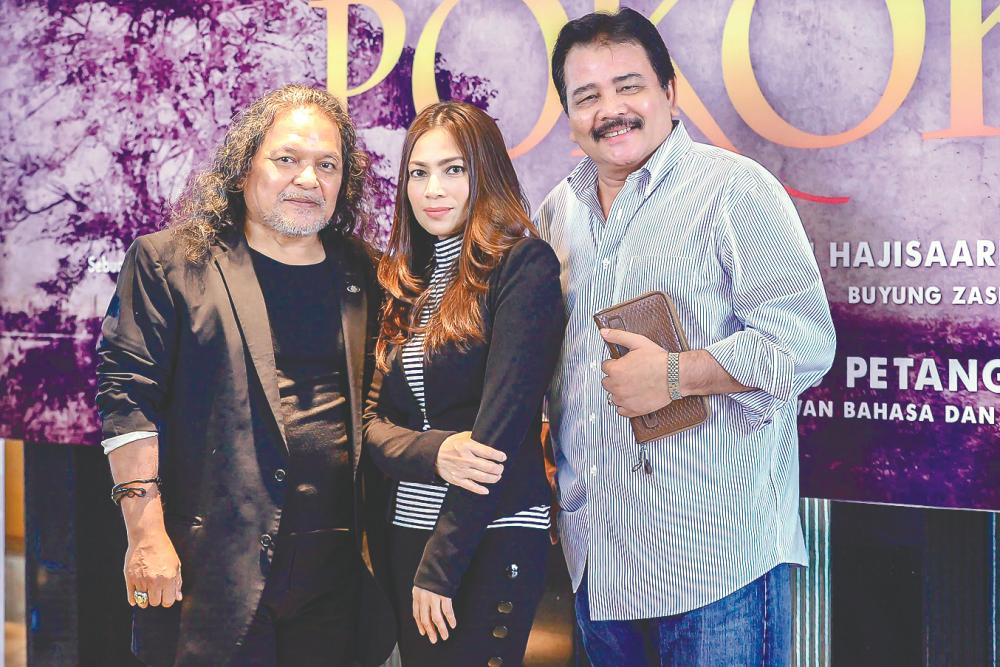A FEMALE convict wants to walk the right path, but there is something pulling her back to her past. That is the premise for Pokok, a theatre play that will be staged at the Dewan Bahasa Pustaka Auditorium from Dec 7 to 16.
The play will be helmed by award-winning director U-Wei Haji Saari, who explains, with a touch of humour: “It is difficult to become good, because we are born to be bad.”
U-Wei is better known for his cutting-edge films such as Kaki Bakar, Hanyut, and Jogho. His films have been shown at prestigious international film festivals.
U-Wei has previously directed two other stage plays – Bakai in 1998, and 10 years later in 2008, Wangi Jadi Saksi. Pokok will be his third stage play, after another decade-long hiatus.
Based on a script written by award-winning writer Johan Jaffar, Pokok centres on Mardiah, a beautiful woman who has never had luck on her side. She is a former drug addict who was convicted of several crimes, including robbery.
After Mardiah meets an amputee named Darwis, she is willing to marry him, and to change her wild ways. Now pregnant with their first child, she lives with him in a house under a big tree.
Darwis is indebted to Tuk Kaya, who allows him to work and live on his land. However, the philandering Tuk Kaya has other motives.
Tuk Kaya is mesmerised by Mardiah’s beauty, and goes all out to get her into his bed.
Mardiah knows what is on Tuk Kaya’s mind, but she doesn’t want to return to her bad old ways.
Her beauty has now become her curse.
The play stars Haliza Misbun as Mardiah, supported by Ebby Saiful as Darwis, and Rahim Jailani as Tuk Kaya. Other cast members include Buyung Zasdar as Amud, a close friend of the couple.
There is a powerful line in the play where Mardiah says: “I used my beauty to seduce, harass, and to commit sin, and finally I was imprisoned. In prison I used my beauty to achieve whatever I wanted. I didn’t hesitate to use my beauty.
“Here, I choose to be ugly ... Because I want to be good ... ”
U-Wei explains that most writers try to be bombastic, but not Johan.
“His simplicity is so profound,” he says.
He explains that he must handle Johan’s story with care, because with the wrong direction, Johan’s beautifully-crafted story could easily turn a cliché soap opera.
“The last thing I want [is to spoil] his profound story,” U-Wei says.
Looking at the synopsis of the play, one wonders if Pokok would have been more suitable for the silver screen rather than a stage play.
At least in a movie, U-Wei could depict the setting of the house under the big tree, where Mardiah lives with Darwis, in a more dramatic fashion.
U-Wei agrees with this perception.
“It would be easy for me to turn Pokok into a film, because film is my forte,” he says.
“But it is more challenging to turn Pokok into a stage play. I like to do difficult things, because difficult things make your life exciting.”
U-Wei describes Mardiah as a strong, but vulnerable woman.
He says: “I always believe women are strong individuals, but men make sure the women do not know they are strong and smart.”
Scriptwriter Johan says that Mardiah is loosely based on a real person, whom he met in the late 1980s when he was an investigative journalist for a magazine.
“She was a beautiful bartender,” he says.
“I was not close to her. I heard a lot of interesting stories about her from the pub crawlers. They told me that she was an ex-convict who had spent time in prison for committing assault and robbery. If you saw her, you could not imagine her doing all those crimes.”
Johan wanted to get close to the bartender to get know her story better. Unfortunately, she quit her job and he could not locate her.
“I could not get her out of my mind,” he says.
Last year, he wrote the script for Pokok. Initially, he never intended to write about the bartender he met years ago.
“I want to write about trees, because I grew up in a village in Muar, Johor, where I was surrounded by trees,” he said.
As his story developed, he decided to include some characteristics of the beautiful bartender into his leading lady.
In his works, Johan always explores the good, the bad and the ugly in the world.
“But in the end, I always celebrate goodness,” he says.













